Seoul Searching
A coup attempt in South Korea, and its sound rejection by democratic forces there, are both a warning and a shining example of courage.
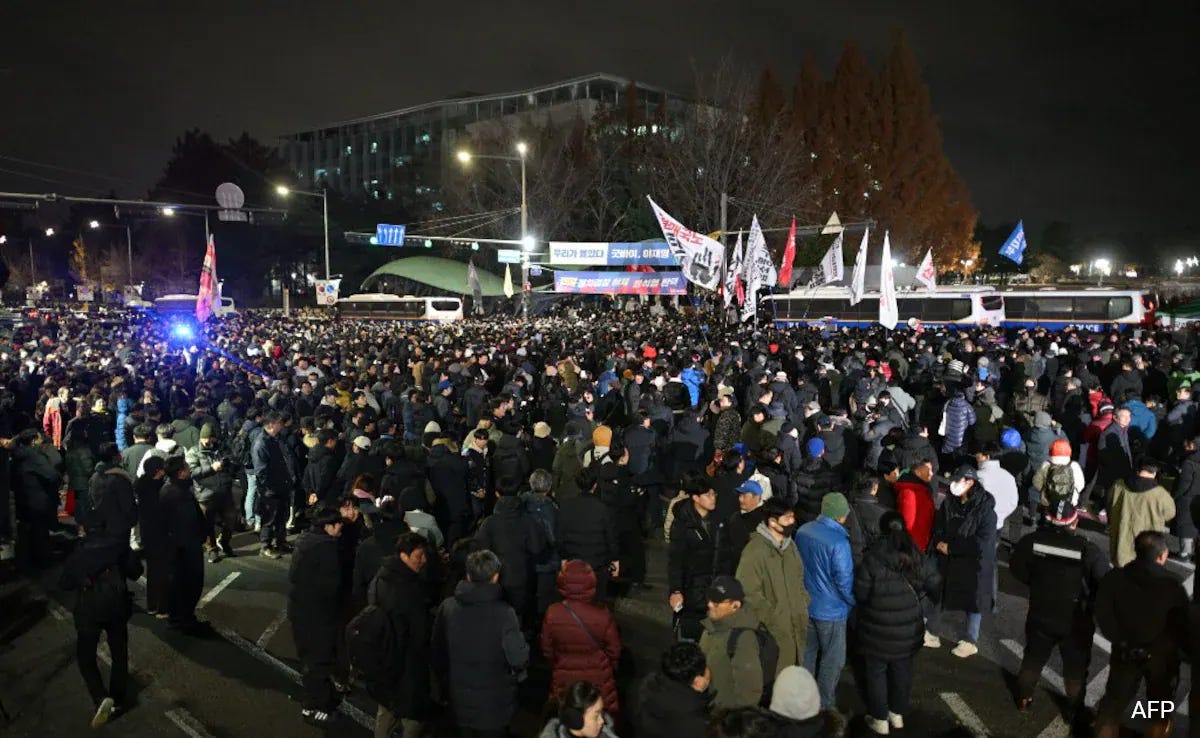
South Koreans remain in shock and are furious over what just took place in their country. But the rest of the free world is looking upon their handling of the coup crisis with broad admiration. Democracy defeated dictatorship in Seoul, and it only took a few hours.
Over the course of one night, South Korea lurched from democracy to martial law then back to democracy, a head spinning chain of events set off by its embattled president, Yoon Suk Yeol. Both the tensions that led to his power grab, and the way democratic forces battled back, carry significant lessons for other democracies, including ours here in the U.S.
For today’s column, let’s travel to the other side of the world and look upon the world’s 13th largest economy, South Korea, which is a key and strategically vital democratic ally of the U.S. with growing soft cultural power in music, television and entertainment. To modern observers, that country feels an unlikely place for democracy to be forced to take a hard stand, and quite a stand it was. But South Korea’s past experience with military rule provides a valuable context for why so many could rally so effectively against an autocratic power grab.
In looking at what happened, I’ll also discuss the political and societal gridlock in South Korea and draw some interesting and even startling parallels to our own in the U.S. The fact that the people of South Korea nearly lost their democracy overnight and the takeaways around how they actually kept that from happening are important lessons for anyone working to stop autocracy and fascism.
The six hour coup
Late Monday night, President Yoon announced the imposition of martial law. His stated reasons were entirely bogus. Here is the relevant part of his decree:
Our National Assembly has become a den of criminals and is attempting to paralyze the nation’s judicial administration system through legislative dictatorship and overthrow the liberal democracy system. The National Assembly, which should be the foundation of liberal democracy, has become a monster that collapses the liberal democracy system. Now, Korea is in a precarious situation where it would not be surprising if it collapsed immediately.
Dear citizens, I declare emergency martial law to defend the free Republic of Korea from the threats of North Korean communist forces and to eradicate the shameless pro-North Korean anti-state forces that are plundering the freedom and happiness of our people and to protect the free constitutional order.
While it’s true that the country suffered from political paralysis, this was because the opposition controlled a commanding majority of the South Korean parliament and had blocked the legislative agenda of the president, as was its right. That’s how democracy works, however messy. The fact was Yoon and his wife were embroiled in scandals that were making regular headlines, his favorables were at just 19 percent, and Yoon appears to have blundered catastrophically under the pressure.
On the question of threats from the “Northern communist forces” and so-called “anti-state” forces, there was simply no evidence that the South Korean opposition was in any way connected to them, just as there is zero evidence that Democrats in the U.S. are “communists,” as Trump has often claimed.
Following the decree, the state took control of all media and banned what Yoon denounced as “fake news.” The army chief of staff then banned all strikes, assemblies and political activities that could incite social unrest.
South Korean society did not comply.
Defying the ban on all non-state run media, local media reported widely on the growing protests, and the people, including news anchor-turned politician Ahn Gwi-ryeong in the clip below, showed tremendous courage standing up for their democratic rights. (Many thanks and kudos to Adam Schwarz on Bluesky for his up-to-the-minute reporting on events as they unfurled, proving that the switch from Twitter to Bluesky for breaking news and great journalism is well underway.)
Despite the army’s prohibition on all strikes, South Korean trade unions organized and called for nationwide work stoppages in protest of Yoon’s decree of martial law. The Korean Confederation of Trade Unions (KCTU) called on its more than one million members to strike, labeling Yoon’s declaration a “crime of insurrection” and urging members to gather in Seoul and other regional locations to oppose him.
“Yoon Suk-yeol has chosen the irrational and anti-democratic method of martial law to extend his political life as he has been driven to the edge,” the group said. “The people will not forgive this. They remember the fate of regimes that declared martial law.”
Then there were the courageous members of the South Korean parliament, 190 of whom braved freezing temperatures in the dead of night in a quest to retake the building, which had been cordoned off by authorities. Opposition leader of the Democratic Party, Lee Jae-myung, called upon ordinary citizens to come to their aid.
“Tanks, armoured personnel carriers and soldiers with guns and knives will rule the country,” Lee warned. “The economy of the Republic of Korea will collapse irretrievably. My fellow citizens, please come to the National Assembly.”
The legislators each scaled the barricades with the help of protestors in order to convene a quorum to vote to undo the decree, citing a provision in the South Korean constitution that expressly authorizes such a vote.
Here is the incredible moment when the leader of the opposition Democratic Party, Lee Jae-myung, live-streamed himself climbing the walls of the National Assembly to get inside the building.
Once inside, there was continuing chaos as parliamentary aides used furniture to prevent armed paratroopers from entering the Assembly hall where the vote to undo the decree was about to occur.
And this is surreal video from within the building as the army sought entrance, with reporters and aides blocking their path, and resisters even deploying fire extinguishers to slow the army’s forward progress.
The 190 members of parliament, 18 of whom were members of Yoon’s own party, voted unanimously to reverse Yoon’s decree. The tension was thick as the vote occurred, as the army prepared to storm the building.
Following the vote, Democratic opposition leader Lee addressed the nation and warned the South Korean military that they would be breaking the law if they continued to implement military rule. The military then retreated, to the cheers of the gathered crowds.
Six hours later, after his cabinet voted to rescind martial law, Yoon appeared again on television and retracted his decree. Yoon’s defense minister, Kim Yong-hyun, who was once Yoon’s personal body guard (again, a familiar sounding story), took responsibility for advising Yoon to make the declaration. But that has not silenced calls for Yoon to step down.
While the immediate crisis of military rule is over, Yoon’s political future remains very much in doubt. There are widespread demands for his resignation and already a move in parliament to impeach him. There are also renewed nationwide calls for strikes to continue unless and until he resigns.
Even the leading conservative newspaper has come out with harsh condemnation of Yoon, accusing him of “insulting” South Korean democracy.
Striking parallels and a warning to us all
As Brian Klaas observed in his piece in The Atlantic,
A right-wing wannabe authoritarian president—a leader who attacks the press, is accused of abusing power for personal gain, uses his power to block investigations into his family’s potential corruption, hopes to stay in office to avoid heading to prison, and only seems to have concepts of a plan to address his nation’s inflation and health care—declared martial law earlier today.
Klaas points out that he could easily be talking about Donald Trump in his second term, and not the crisis that just unfolded so rapidly in South Korea.
Like Trump, Yoon won office two years ago by a very thin popular margin, in Yoon’s case 0.8 percent. His victory came during a period of high inflation and economic anxiety. The New York Times described a “cauldron of discontent” that has marked post-pandemic South Korea that could easily describe the U.S.:
Skyrocketing home prices have forced people to live in ever-smaller spaces at ever-greater cost. Recent college graduates have struggled to find suitable work, sometimes accusing older generations of locking them out.
Many young people, facing uncertain economic prospects, are reluctant to marry or have children, and the country has both a rapidly aging population and the world’s lowest birthrate. Increasingly, voters have blamed their political opponents, as well as immigrants and feminists.
And here’s something else we share: The backdrop of the most recent election was a brewing battle between the sexes in South Korea. In that country, as in ours, young women have moved decisively left and progressive while young men have veered sharply right. Yoon, seeking to stoke bias and resentment among young men, promised to abolish the nation’s ministry of gender equality.
Sound familiar? There’s more.
As The Guardian reported, Yoon has labeled his political opponents “anti-state forces” and the media as “fake news.” Since narrowly winning the election in 2022, Yoon’s administration has deployed defamation lawsuits against the press in a bid to silence his critics, much as Trump has done with major broadcasters in the U.S.
Indeed, Trump’s nominees like Kash Patel have openly threatened to come after the media using the power of the FBI. As I wrote just yesterday,
On Steve Bannon’s War Room podcast, Patel said specifically that he would “come after people in the media” who had “helped Joe Biden rig elections”—combining an attack upon the freedom of the press with an outlandish false conspiracy over a stolen election.
Since taking office, Yoon has grown frustrated over legislative impasses, even though they were fairly inevitable from an opposition deeply opposed to his agenda. Trump will likely face the same sorts of headwinds with a threadbare GOP majority in the House and more moderate GOP senators already moving to block some of his most radical nominees, including Matt Gaetz and Pete Hegseth.
In Yoon’s case, the frustrations grew until he made a clumsy and ill-conceived powergrab. South Korea’s constitution states that the president, who is also commander-in-chief, may declare martial law “in time of war, armed conflict or similar national emergency.” But there was no war or armed conflict, and his “national emergency” was entirely invented.
If Trump grows impatient or the pressures upon him by the press and the Democratic opposition grow too great, he could attempt a similar move, no doubt. In fact, we should take South Korea’s example as a clear warning that a democracy in a prosperous country could tumble overnight into chaos and military rule if democratic forces do not act quickly in response.
Back in October, I wrote about how Trump could attempt to get around laws like the Posse Comitatus Act, which generally forbids the use of federal armed forces against the U.S. population and stands for the principle that the military cannot interfere in civilian affairs absent express legal authority.
But Trump could get around this through the Insurrection Act by declaring there is some kind of “conspiracy” to deny certain “rights” that states like California or New York are refusing to act upon. That sure sounds a lot like the “anti-state” pretense Yoon just used to decree martial law in South Korea.
Presidents like Yoon or Trump do not feel constrained by laws or even common sense or decency. To stop them from seizing complete power, it takes people willing to mobilize in the streets, press willing to defy censorship orders, unions willing to call for general strikes, legislators ready to risk their safety, and a military prepared to stand down in order to stop a determined takeover of the government by a dictator.
The chances are not negligible that Trump will attempt such a decree at some point during his tenure. After all, he has already said he wants to be a Day One dictator, and he has toyed in the past with invoking the Insurrection Act, thwarted only by cooler heads who will not be present this second time around.
South Koreans were caught completely by surprise by Yoon’s decree, as there was no indication he was even considering such a drastic move. That country hasn’t been ruled under martial law since the late 1980s. But the memory of the repressions and violence of that period still haunt much of South Korean civil society, so they were quick to rise up and reject a return to it this week.
The U.S. has no comparable experience with martial law and dictatorships. January 6 was an insurrection, but one where opponents of democracy were trying to stop legislators from certifying the presidential election. Authorities were on the side of the legislators, trying to protect them from the violent mob unleashed by Trump.
Nor does the U.S. Constitution or any federal law provide a clear mechanism for undoing martial law once decreed, other than to seek a court order to overturn it. But based on recent rulings, if the final decision rests with this Supreme Court, the fate of the Republic is shaky at best.
That means there likely is no quick way out of an unlawful or pretextual decree by Trump under the Insurrection Act, or some other kind of emergency powers declaration, under which he assumes full control of the government and can silence all dissent. In light of the South Korean example, civic leaders, union officials, legislators and ordinary citizens must begin to ask an important question: What will they actually do if Trump seeks to end our democracy by decree? How far would they go and how would they try to stop him?
This is no longer some abstract thought experiment. Through these events in South Korea, we have now been duly warned of the risks of autocratic takeover. The future of our democracy may very well depend on whether we can match the kind of response we just witnessed. We must take the South Koreans’ complete rejection of military dictatorship as an inspiring example and pledge to defend democracy with equal passion, resolve and action.




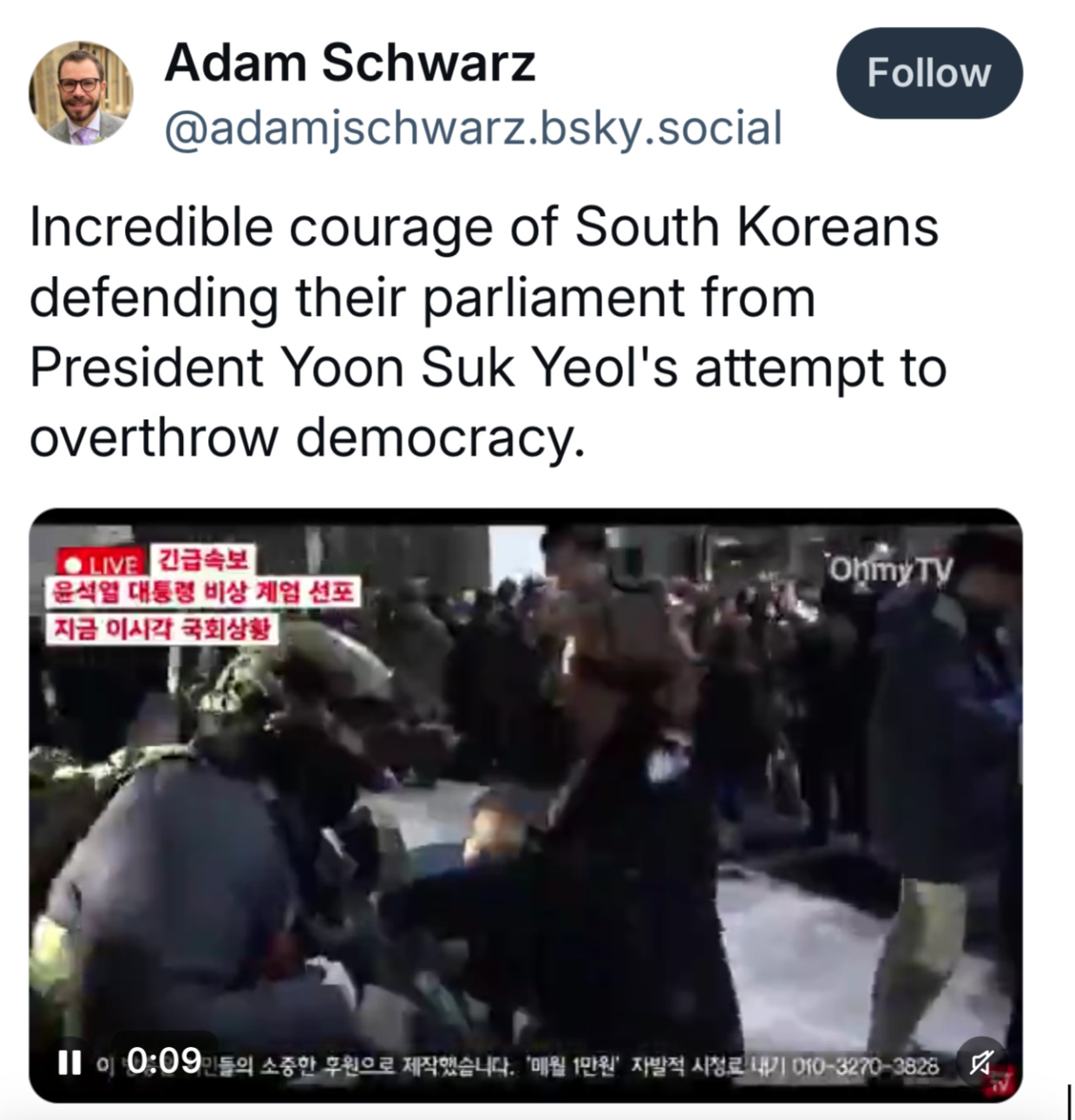
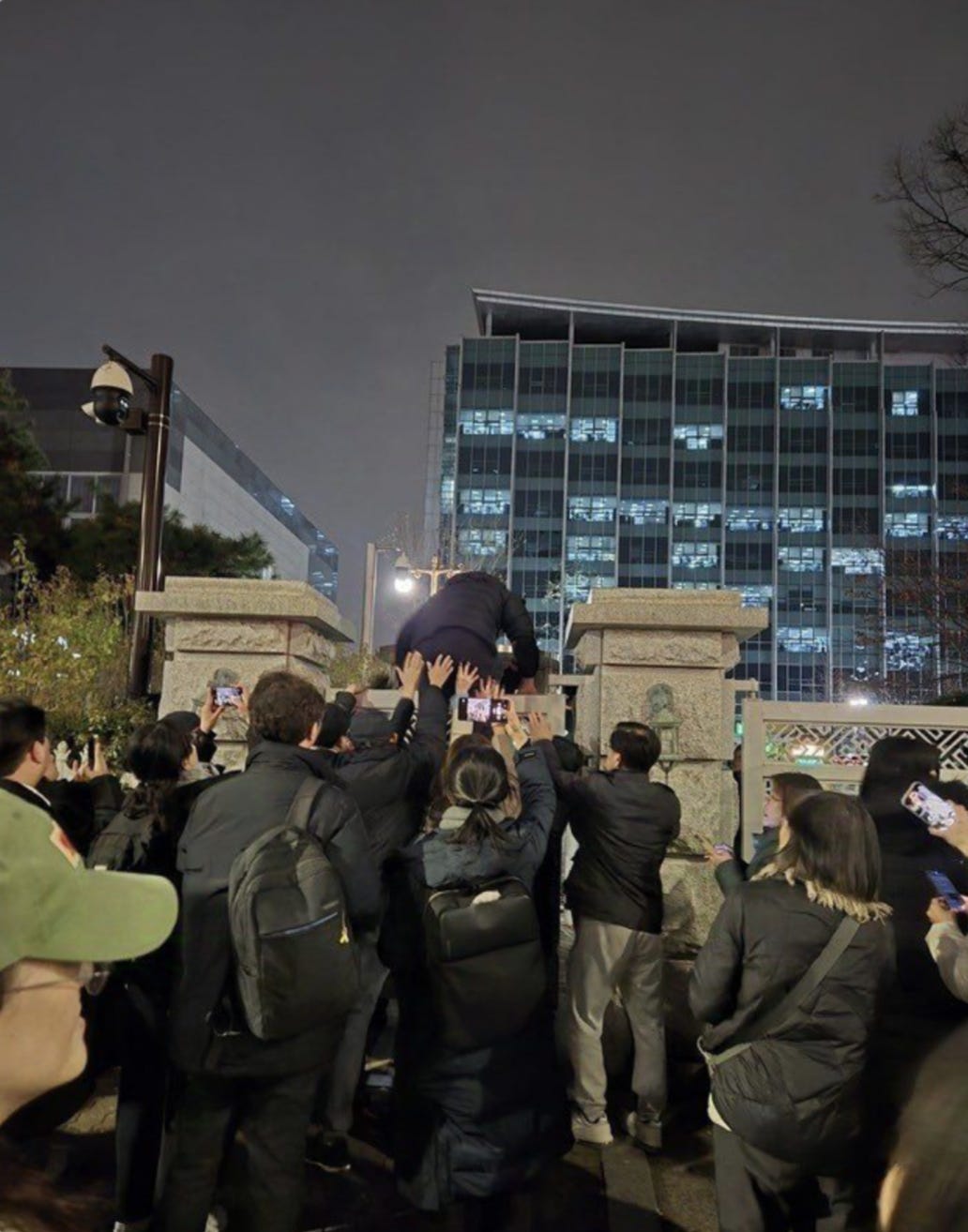
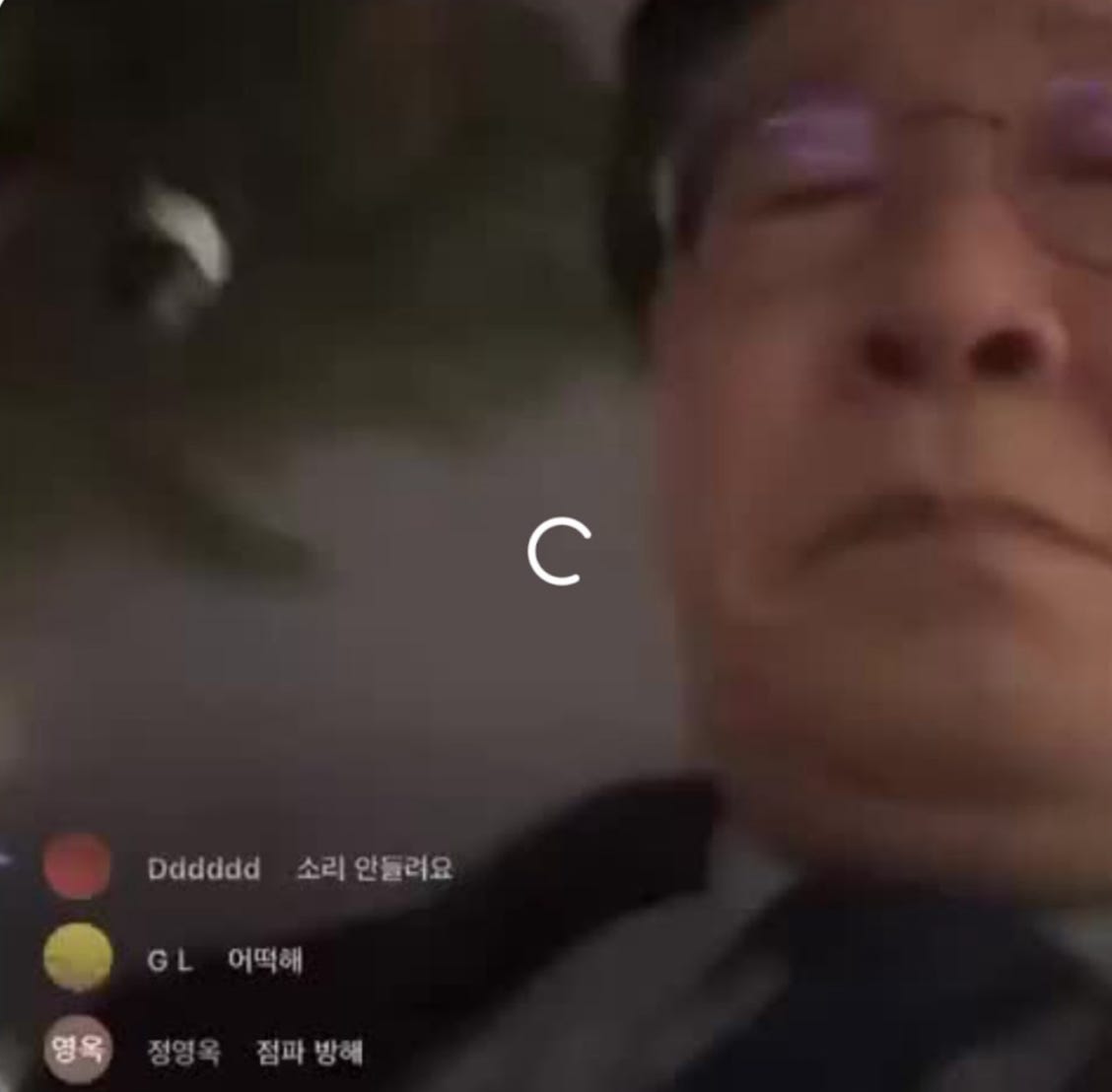
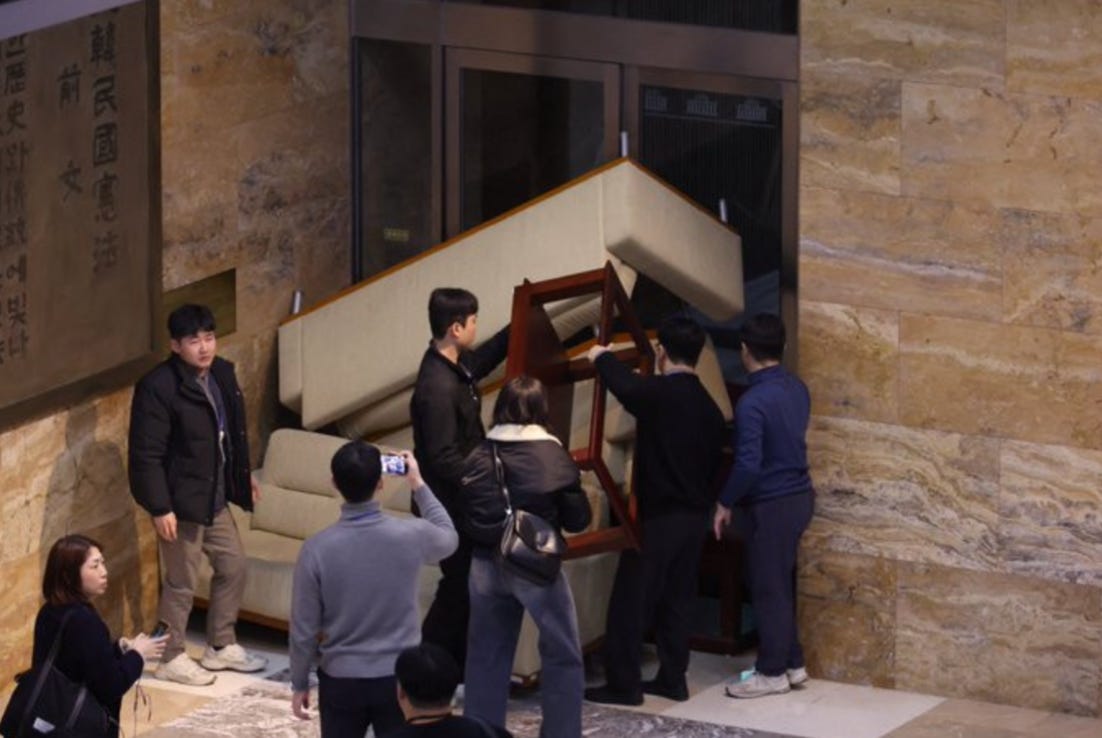
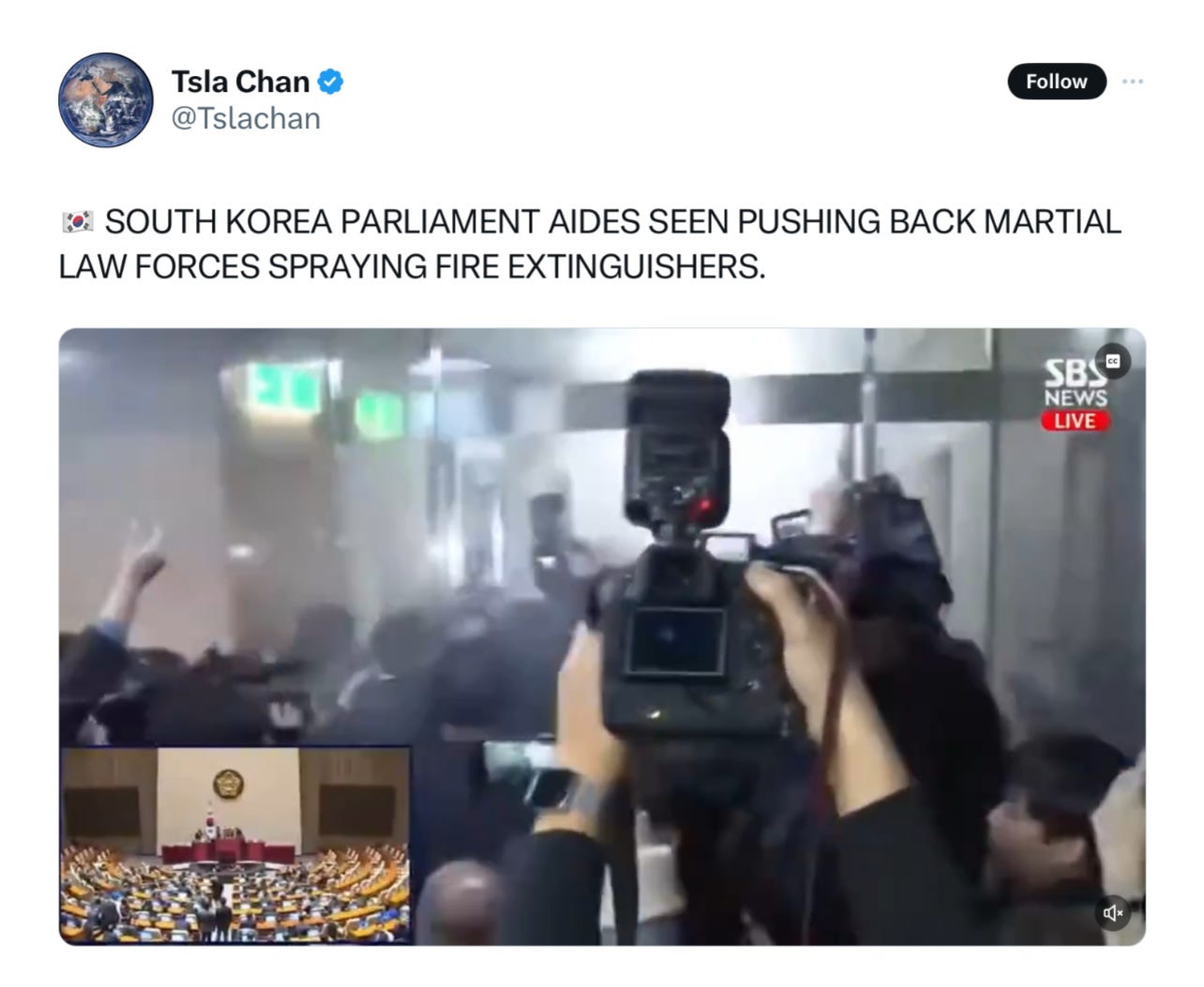
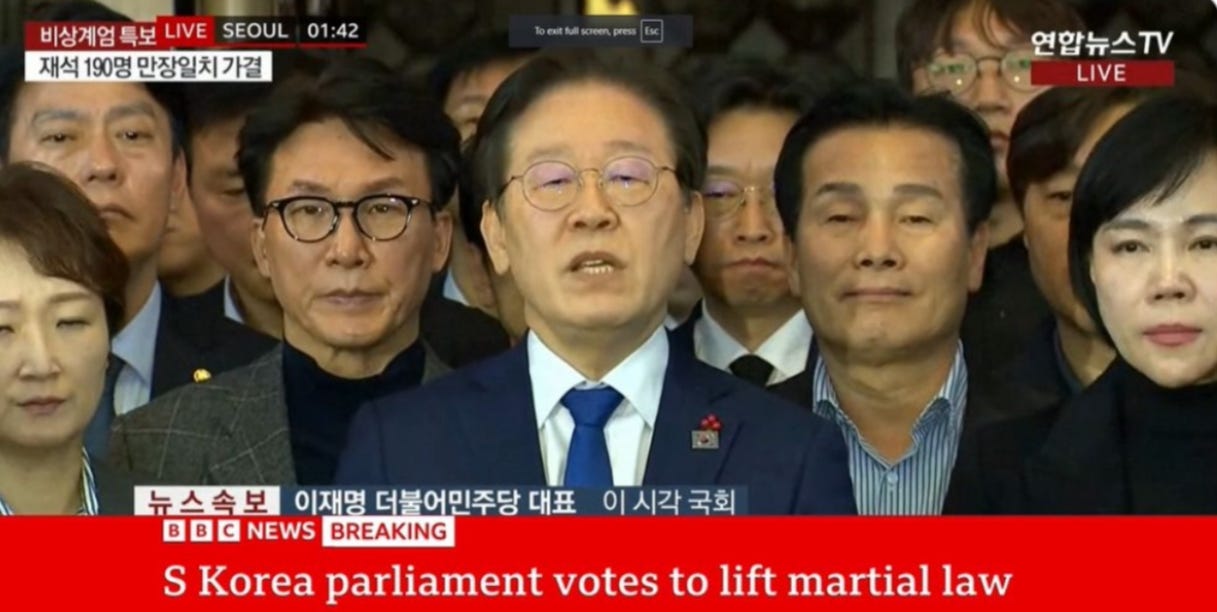
Wow. 😮. Here’s my concern: that the press ( and I mean, the legacy press) will not do what the South Korean press did. We need to mobilize journalists at blue sky to take over if there is martial law ever declared by Trump. I think that’s the only way we can get any chance of overturning a dictator, i.e. Trump.
Insuring all legitimate avenues of communication remain available and supported while continuing vigilance into daily political activities seems our best course of action. Your work and the work of other Substack partners is paramount. Jay thank you for your continued dedication to our education and enlightenment!!❤️